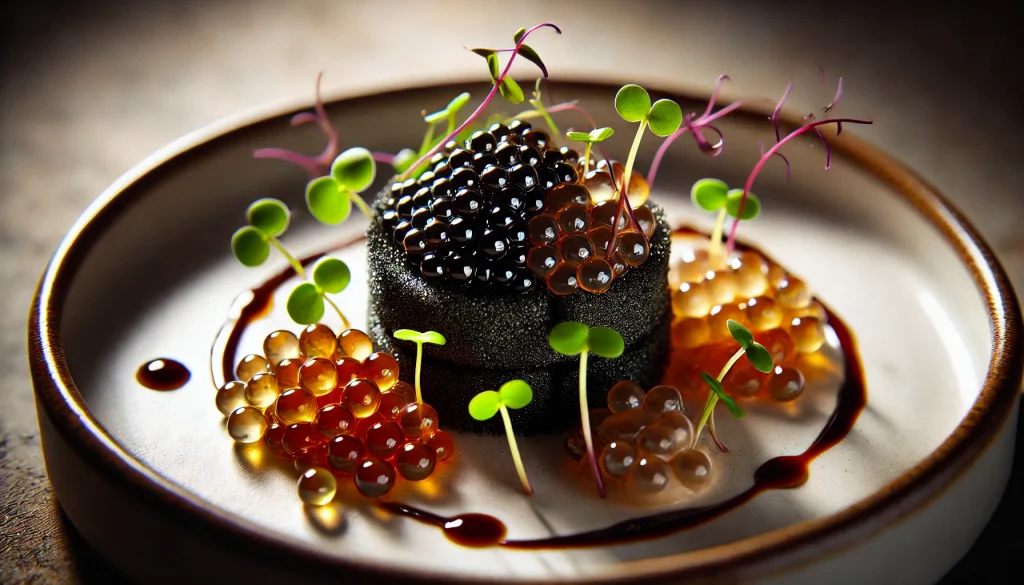Vegetarian & Vegan Caviar Substitutes
As plant-based diets gain popularity, vegan and vegetarian caviar substitutes—made from ingredients like seaweed and balsamic pearls—offer a sustainable and ethical alternative to traditional sturgeon caviar while still mimicking its taste and texture. These substitutes not only reduce environmental impact but also provide a luxurious, guilt-free indulgence for those seeking a cruelty-free gourmet experience.

Table of Contents
- Understanding Traditional Caviar
- The Need for Plant-Based Substitutes
- Popular Vegetarian/Vegan Caviar Alternatives
- Comparing Taste and Texture
- The Final Scoop: A Taste of the Future
Key Points
- Plant-based caviar offers a refined alternative to traditional sturgeon roe, catering to those who prioritize sustainability and ethical sourcing. It’s a guilt-free indulgence that aligns with conscious dining choices.
- Crafted from innovative ingredients like seaweed pearls and balsamic spheres, these gourmet alternatives capture the essence of classic caviar while introducing new layers of depth and nutritional value.
- With fewer calories, zero cholesterol, and a clean ingredient profile, plant-based caviar is a sophisticated choice for those embracing wellness-focused and eco-friendly gastronomy.
Imagine attending a fancy soirée, you’re offered a canapé topped with what appears to be traditional caviar. But wait, you’re told it’s actually a vegan substitute made from seaweed. Surprised? We certainly were when we first encountered vegan caviar. As more people adopt plant-based diets, the demand for vegetarian and vegan alternatives to luxury foods like caviar is on the rise. But how do these substitutes compare to the real deal in terms of taste and texture? Well, let’s just say the results might shock you.
The Perfect Mash-Up of Luxury and Comfort
Before we delve into plant-based substitutes, it’s crucial to understand what traditional caviar is and why it’s highly prized in many cultures. Caviar, a luxury food item, consists of salt-cured eggs from certain species of sturgeon found in the Caspian and Black Seas. The high value placed on caviar is tied both to its unique, rich taste and to the intricate and labor-intensive caviar harvesting methods required to produce it.
These methods involve capturing mature sturgeon, extracting their eggs without causing harm, and then salting and packaging the eggs. The process is arduous and requires a lot of time, contributing to caviar’s exclusivity and hefty price tag.
Understanding the caviar grading system is also key to comprehending its prestige. Caviar is graded based on its color, size, and texture. The highest grade, known as “Beluga,” features large, creamy eggs that are light in color. Lower grades might have smaller eggs, darker colors, or a less smooth texture.
In essence, the allure of traditional caviar lies in its rarity, the sophistication of its harvesting and grading processes, and its distinctive sensory appeal. It’s this combination that plant-based substitutes aim to emulate.
The Need for Plant-Based Substitutes
Amid growing environmental concerns and dietary preferences, there’s an increasing demand for plant-based caviar substitutes that can deliver a similar gastronomic experience without the environmental impact or ethical concerns associated with traditional caviar production. This shift stems from a broader movement towards sustainable and humane food choices, where the ethical implications of our dietary habits come under scrutiny.
Traditional caviar production often involves harmful farming practices and overfishing, which negatively affect our oceans and marine biodiversity. By choosing plant-based alternatives, we can enjoy the luxurious taste of caviar without contributing to these environmental challenges.
Moreover, the health benefits of plant-based foods are becoming increasingly evident. Such substitutes are often rich in vital nutrients and antioxidants, with lower levels of unhealthy fats, making them a healthier choice for consumers. They can also cater to those with specific dietary restrictions or allergies, further increasing their appeal.

Popular Vegetarian/Vegan Caviar Alternatives
Let’s dive into some popular vegetarian and vegan caviar alternatives that not only offer a similar sensory experience but also align with sustainable and ethical food choices. The caviar production ethics are often questioned due to overfishing and inhumane harvesting practices. By switching to plant-based alternatives, we’re promoting a more sustainable and ethical food industry.
One of the top picks is Caviart, made from seaweed. This option mimics the salty taste and popping texture of traditional caviar, without the associated ethical concerns. It’s a guilt-free indulgence that also boasts a host of health benefits, including a high content of omega-3 fatty acids and fiber.
Another remarkable alternative is Balsamic Pearls. They’re created using molecular gastronomy techniques and offer a unique, tangy twist to the traditional caviar experience. These pearls are rich in antioxidants, contributing to a health benefits comparison that favors plant-based alternatives.
Comparing Taste and Texture
In evaluating the taste and texture of these plant-based caviar alternatives, we find intriguing similarities and differences when compared with traditional caviar. Many vegan caviar substitutes emulate the salty and slightly fishy undertones of their seafood counterparts, offering a similar sensory experience. The texture, often achieved using seaweed or other natural ingredients, mirrors the unique pop and burst of flavor associated with traditional caviar.
However, nuances exist. Some plant-based caviars possess a slightly sweeter or earthier flavor profile, derived from the specific ingredients used. The texture might also be less firm in certain products, lending a softer mouthfeel.
When we delve into a sustainability comparison, vegan caviar shines. Traditional caviar production, reliant on sturgeon fish, has environmental implications due to overfishing. Plant-based alternatives, on the other hand, utilize sustainable and often organic ingredients, reducing their environmental footprint.
Lastly, a health benefits analysis reveals that vegan caviar alternatives typically contain fewer calories and less cholesterol than traditional caviar, while still providing a source of important nutrients. They are a healthier choice without sacrificing the luxury and indulgence associated with caviar. Overall, these plant-based substitutes offer a compelling, sustainable and healthful alternative to traditional caviar.
The Final Scoop: A Taste of the Future
In conclusion, we’ve seen that traditional caviar, while a delicacy for many, isn’t suitable for everyone due to dietary restrictions or ethical beliefs. Thankfully, there are numerous plant-based alternatives that mimic both the taste and texture of real caviar. Whether you’re vegetarian, vegan, or simply curious, these substitutes provide an exciting opportunity to enjoy this gourmet treat in a more sustainable, cruelty-free way. So, why not give them a try?
Caviar Alternatives Frequently Asked Questions
-
What’s vegan caviar made of?
Vegan caviar is usually made from ingredients like seaweed or balsamic pearls. For example, a popular brand called Caviart uses seaweed to create that signature caviar-like texture and taste.
-
Why do people choose plant-based caviar?
There’s a growing demand for plant-based alternatives because of environmental concerns, ethical considerations, and dietary preferences. Traditional caviar production can impact marine life, so many people are looking for a more sustainable option.
-
Does vegan caviar taste like the real thing?
Many plant-based caviars are designed to mimic the salty, slightly briny flavor of traditional caviar, along with that signature pop. Some versions might have a hint of sweetness or an earthier taste, and the texture can sometimes be a little softer.
-
Is vegan caviar healthier than traditional caviar?
Generally, yes! Vegan caviar tends to have fewer calories and no cholesterol while still offering beneficial nutrients. Many plant-based options are packed with antioxidants and essential nutrients but contain less unhealthy fat compared to traditional caviar.
-
How is vegan caviar better for the environment?
Since plant-based caviar is made from sustainable ingredients like seaweed, it has a much smaller environmental footprint than traditional caviar, which can contribute to overfishing and habitat destruction. Choosing a vegan alternative helps support more sustainable food practices.
